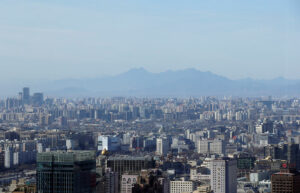BEIJING – China’s economy grew at a faster-than-expected clip in the third quarter, while consumption and industrial activity in September also surprised on the upside, suggesting the recent flurry of policy measures is helping to bolster a tentative recovery.
Rapidly weakening growth in the world’s second-biggest economy since the second quarter prompted authorities to roll out support steps over the past weeks, and Wednesday’s batch of data indicated the stimulus is starting to gain traction although a property crisis and other headwinds pose risks to the outlook.
Gross domestic product (GDP) grew 4.9% in July-September from the year earlier, data released by the National Bureau of Statistics showed, versus analysts’ expectations in a Reuters poll for a 4.4% increase but slower than the 6.3% expansion in the second quarter.
On a quarter-by-quarter basis, GDP grew 1.3% in the third quarter, accelerating from a revised 0.5% in the second quarter and above the forecast for growth of 1.0%.
“It seems that all of that stimulus is finally beginning to take effect, with a broad beat from growth, retail sales, industrial production and unemployment,” said Matt Simpson, senior market analyst at City Index in Brisbane.
The economy faltered in the second quarter after a brief post-COVID recovery, dragged by a property downturn and huge debt due to a decades-long infrastructure binge.
Beijing has in recent weeks unveiled a raft of measures, including more public works spending, interest rate cuts, property easing and efforts to shore up the private sector.
The recovery momentum suggests the government’s full year 2023 growth target of around 5.0% is likely to be achieved.
“The improvement in Q3 economic data makes it less likely for the government to launch stimulus in Q4, as the growth target of 5% is set to be achieved,” said Zhiwei Zhang, chief economist at Pinpoint Asset Management.
“The focus of the government and the market will shift to the growth outlook for next year. The key issue is what growth target the government will set and how much fiscal easing will take place.”
Industrial output in September grew a stronger than expected 4.5% from a year earlier, but the pace was unchanged from August, according to the data. Analysts had expected a 4.3% increase.
Growth of retail sales, a gauge of consumption, also beat expectations, rising 5.5% last month, and accelerating from a 4.6% increase in August. Analysts had expected retail sales to expand 4.9%.
Fixed asset investment grew 3.1% in the first nine months of 2023 from the same period a year earlier, versus expectations for a 3.2% rise. It expanded 3.2% in the January-August period.
Property investment in the first nine months of 2023 fell by 9.1% from a year earlier, after slumping 8.8% in January-August, the data showed. – Reuters

